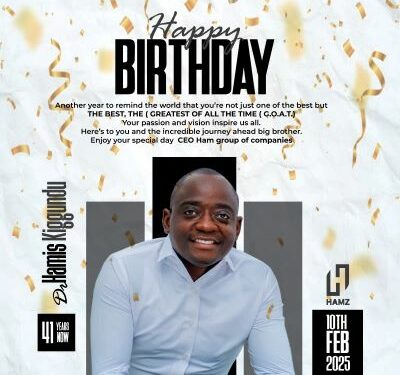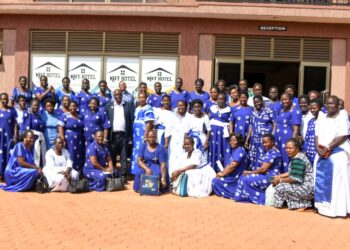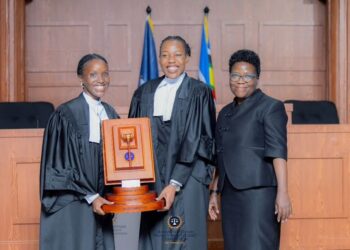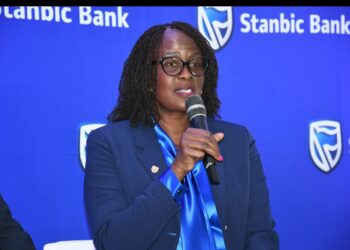What are Ham Kiggundu’s Chances Against Erias Lukwago in the Kampala Lord Mayor’s race?
The simmering feud between Kampala Lord Mayor Erias Lukwago and businessman Hamis “Ham” Kiggundu has taken a dramatic turn, with Lukwago throwing down the gauntlet, challenging Ham to contest the Lord Mayor’s seat in 2026. In a fiery outburst, Lukwago swore Ham would never unseat him, reigniting a rivalry that has gripped Uganda’s capital. As tensions escalate, this analysis delves into Ham’s chances of beating Lukwago, the roots of their animosity, Ham’s potential advantages, and the trajectory of their political war.
Lukwago, a veteran politician and three-term Lord Mayor, enjoys a formidable reputation. First elected in 2011 under the Democratic Party (DP) banner before switching to the Forum for Democratic Change (FDC), he has consistently trounced opponents, including NRM’s Peter Sematimba and Ragga Dee, with landslide victories—64.4% in 2011 and 75% in 2016. His latest win in 2021, securing 194,592 votes against NUP’s Nabilah Naggayi Sempala’s 60,082, underscores his enduring popularity. Lukwago’s appeal lies in his defiance against the NRM establishment and his vocal advocacy for Kampala’s downtrodden, making him a near-iconic figure among urban voters.
Ham Kiggundu, a 41-year-old tycoon, is a political novice but no stranger to controversy. Known for his real estate empire—including Ham Towers and the revamped Nakivubo Stadium—he’s amassed wealth and influence since his early 30s. His book, Success and Failure Based on Reason and Reality, endorsed by the National Curriculum Development Centre in 2019, showcases his ambition to shape public discourse. Yet, his ventures, particularly Nakivubo Stadium, have drawn Lukwago’s ire, with the mayor accusing Ham of exacerbating Kampala’s flooding by building on the Nakivubo water channel—a claim Ham dismisses as baseless.
Ham’s chances against Lukwago hinge on several factors. On paper, Lukwago’s entrenched support and electoral track record dwarf Ham’s untested candidacy. Kampala’s 1.28 million registered voters (per 2021 figures) lean heavily toward opposition figures like Lukwago, especially in a city where NRM struggles to break 35% in mayoral races. Ham, if he runs, would likely align with NRM given his perceived ties to the ruling elite—a liability in a constituency wary of Museveni’s influence. Political analyst Sarah Bireete notes, “Lukwago’s grassroots machine and anti-establishment brand are tough to crack, especially for a newcomer tied to wealth rather than service.”
Yet, Ham holds distinct advantages. His financial muscle could fund a lavish campaign, dwarfing Lukwago’s typically modest efforts. Posts on X suggest Ham’s Nakivubo project, despite criticism, has fans who see it as a symbol of development—potentially swaying younger voters Lukwago struggles to fully capture. Ham’s narrative as a self-made success, bolstered by his book and media presence, contrasts with Lukwago’s image as a career politician. In a city frustrated by stagnant infrastructure, Ham could pitch himself as a pragmatic fixer, leveraging his business acumen against Lukwago’s legalistic tenure.
The root of Lukwago’s hostility toward Ham lies in a clash of visions and values. Lukwago, a lawyer with a human rights bent, views Ham’s projects—like Nakivubo—as emblematic of cronyism and land-grabbing under NRM’s watch. His March 27, 2025, accusation that Ham’s construction worsened downtown flooding reflects a broader critique: that Ham prioritizes profit over public good. X posts from 2023 highlight Lukwago mocking Nakivubo Stadium as a “table tennis hall,” revealing a personal disdain for Ham’s flamboyance. Ham, in turn, frames Lukwago as an obstructionist, with a Facebook retort last week insisting it’s “our obligation as Ugandans to spearhead development”—a jab at the mayor’s perceived inertia.
Ham’s edge over Lukwago, beyond cash and charisma, lies in shifting demographics. Kampala’s youth—over 60% of the population under 25—may tire of Lukwago’s 15-year reign, especially if Ham markets himself as a fresh alternative. His outsider status could appeal to those disillusioned by partisan gridlock, though it risks alienating Lukwago’s loyal base. Analyst John Kakande argues, “Ham’s money and messaging could disrupt, but he’d need a flawless campaign to dent Lukwago’s armor.”
Where is this war headed? If Ham takes the challenge, 2026 could see a bruising, polarizing contest—Lukwago’s populism versus Ham’s plutocracy. Lukwago’s vow that Ham “will never beat me” signals a fight to the finish, potentially deepening their personal and political rift. Without a groundswell of anti-Lukwago sentiment or a major scandal, Ham’s odds remain slim—perhaps a 30% shot, given Lukwago’s dominance. But in Uganda’s volatile politics, money and momentum can shift tides. For now, their feud fuels headlines, with Kampala watching to see if Ham dares step into the ring.
Do you have a story in your community or an opinion to share with us: Email us at editorial@watchdoguganda.com














